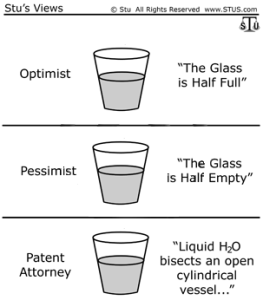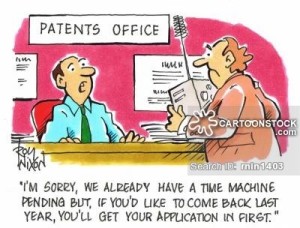A post from student blogger Josh
Well, it’s that time of the semester again, where we’re all either studying for midterms or putting a truly epic effort into procrastination. Since I’m currently participating in the later of those two options, I figured I should post something about things you can do other than study that will assist you in life as a graduate student.
1). Read a book. The book doesn’t have to be a technical manual, and it doesn’t have to pertain to patent law in any way. While this will absolutely not help you to pass your exams, reading well – written texts is a great way to improve your writing skills. If you intend to be a patent agent, those skills come in handy every day. While there’s the foreign land of patent applications, where regular English doesn’t apply, patent agents are also in constant correspondence with clients and attorneys. Learning to communicate concisely and effectively in written form is important for many facets of your career. I’m currently avoiding studying by burying my nose in Hunter S. Thomson’s “Fear and Loathing in Las Vegas”. While I initially intended to write this post in Thomson’s style as an exercise, I’ve found that (given Notre Dame’s zero tolerance policy for certain behaviors) this would be an unwise idea. However, I do fear and loath midterms, so the title will remain.
2). Figure out the rest of your life. I just discovered that my apartment has been 65 Fahrenheit for the past week because apparently, one has to turn on the heater via the thermostat control panel. Now that things are toasty and warm here, I’ve also cleaned my dishes, restocked the kitchen, and swept/scrubbed every hard surface and carpet available. Did this help me study? No. But it had to be done at some point, and now I feel like less of a frozen slob.
3). Write a blog post. If you’re fortunate enough to get the digital media fellowship that MSPL offers, take it. The tuition discount is worth it, and sometimes it helps to take a break from the more rigorous MSPL material by just writing about the program.
4). Read publications on Patently0, IP Law 360, and other groups that discuss intellectual property law. These offer new ways of thinking about the law, and also make great references for in class discussions. Plus, while you’ll never be tested on this material, having an understanding of current topics in IP is critical to practicing patent law as a professional.
5). Learn about the technologies that your professors work closely with. Professor Wack (patent law and prosecution) has spent many years working on patents in biomedical engineering, specifically pertaining to artificial limbs and joints. Being familiar with these technologies gives you as a student a background for better understanding many of the examples used in class. For you automotive people (like me), learn specifically about how the parts of a car actually fit together. Professor McGlynn’s brief examples regarding transfer cases, gearboxes, and differentials that he uses in class are best understood if you actually know what these things are. None of this knowledge is essential to doing well in the courses, but having it certainly never hurts.
6). Know your deadlines. Make a calendar if you have to, but know when you have exams, meetings, and assignments. It’s a lot harder to mess up one of these things if you are well aware of them in advance. Time management doesn’t suddenly stop becoming a necessary skill when you graduate.
7). Have a social life. Make plans to do something fun as soon as your midterms are over. For instance, the Linebacker Inn has $7 pitchers of decent beer on Mondays. If you’re more of a foodie, there are all sorts of places to eat in South Bend, so grab some friends or a special someone and go enjoy a decent meal. See a movie, go dancing, learn to ride a motorcycle, take a road trip… it really doesn’t matter. Do whatever floats your boat, as long as it’s worth waiting for. I highly recommend bringing a friend or two along. Great times, like cheap bottles of wine, are always better when shared.
Look at that. I just burned half an hour. I guess that means I should probably try not to fail my midterms.


